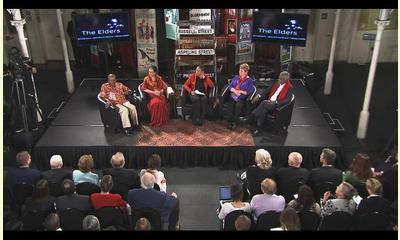|
|
The Elders debate ethical leadership (South Africa)
un article par The Elders and Al Jazeera South2North (selections)
Videos: The Elders debate ethical leadership (part 1)
The Elders debate ethical leadership (part 2)
While in Cape Town for their biannual meeting, The
Elders held a debate on ethical leadership. In
part one Kofi Annan, Gro Harlem Brundtland, Hina
Jilani and Desmond Tutu focus on the challenges of
global governance and peace-building from Syria to
South Africa. Moderated by South African
journalist Redi Tlhabi, the debate was broadcast
on Al Jazeera's South2North programme.. . .

click on photo to enlarge
"We need leaders like Madiba," says Tutu,
referring to former South African president and
Nobel Prize winner Nelson Mandela, who handpicked
the initial Elders in 2007. "We need people who
are not there for what they can get out; they are
there for the sake of the people."
"To be bold; to have the courage of your
convictions; and to think long-term, not short-term
or for political expedience; those are
characteristics common to good leaders," Bruntland
tells the audience . . .
Jilani was appointed to The Elders in July 2013. She
says part of what attracted her to the group was,
"we don't just speak truth to power; we show wisdom
to power."
The Elders debate whether military intervention is
ever necessary; why prevention is always better
than intervention; the difference between
retributive justice and restorative justice; and
balancing addressing the crimes of the past with
the needs of the future. . .
In part two, Redi Tlhabi is joined by two Nobel
Prize winners - former US President Jimmy Carter
and former Finnish President Martti Ahtisaari - as
well as Mary Robinson, the first female president
of Ireland and a former United Nations High
Commissioner for Human Rights.
Redi asks Robinson if the International Criminal
Court (ICC) is racist, given the fact that almost
all of its cases have involved African countries or
leaders.
"There is a view at the moment that Africa is being
singled out .... It's important that the system is
seen as fair. There are problems now of perception
and we have to address that," Robinson said.
Using the recent conviction of former Liberian
President Charles Taylor by a special international
tribunal as an example, Carter points out: "Most of
the people brought to justice so far have been
delivered by their own people."
Ahtisaari says it is harder for African leaders to
excel, not just because of the additional issues
they face but because they lack the kind of
institutional support he had while at the helm in
Finland: "It’s much more complicated to be a
president in Africa because in many countries the
institutions that are absolutely vital to run a
country are not there" . . .
At the end of the show, Richard Branson, who co-
founded The Elders with Peter Gabriel, called
them, "an incredible group of global statesmen who
put their egos behind them, politics behind them,
who have no axes to grind, and who aren't trying
to get elected. The Elders have played a wonderful
role in the last six years".
|








|
DISCUSSION
Question(s) liée(s) à cet article:
Where in the world can we find good leadership today?,
* * * * *
Commentaire le plus récent:
Once again, as they have done now each year since 2009, the Nobel Women's Initiative provides biographies of 16 women leaders involved in local action for peace and justice around the world, and in particular to stop violence against women. Last year's biographies were listed in the CPNN discussionboard.

|
|









